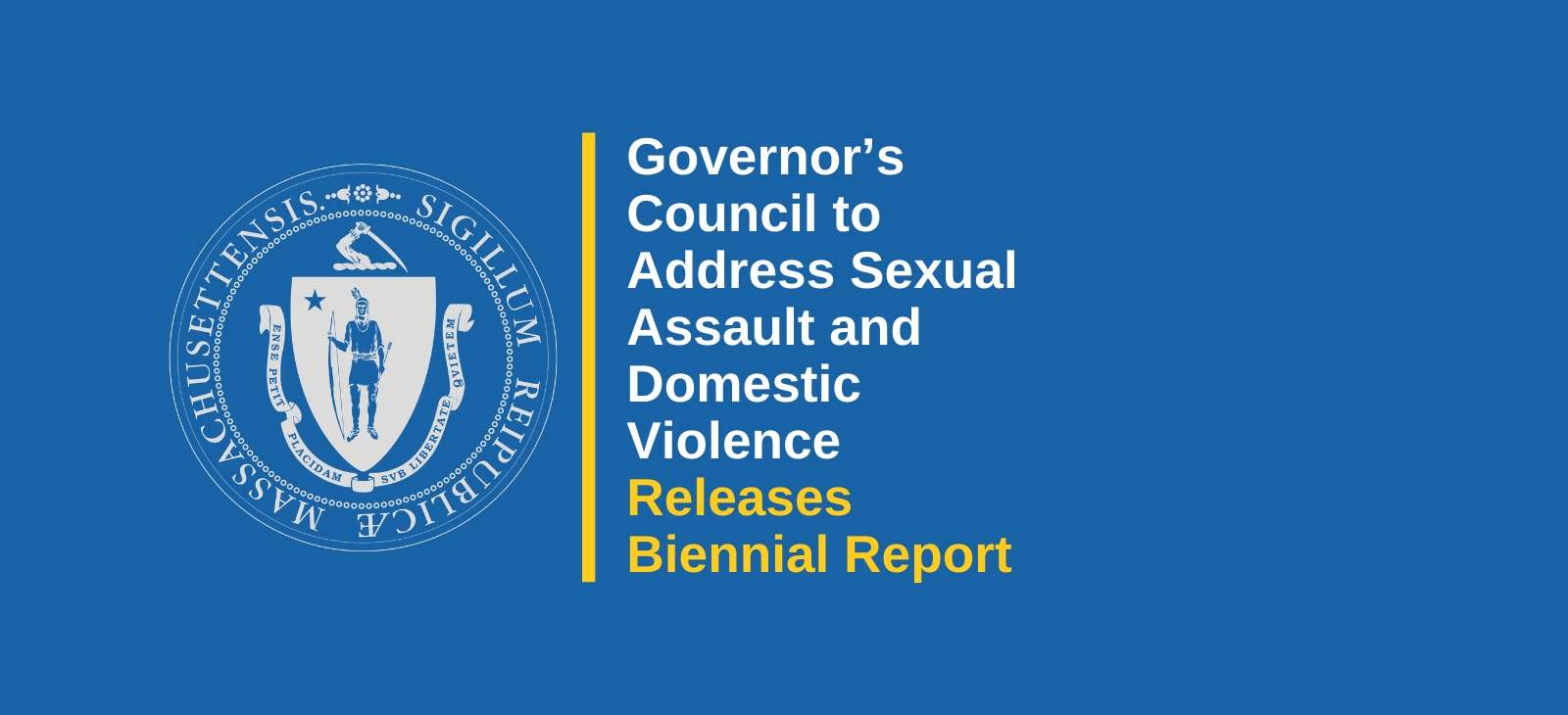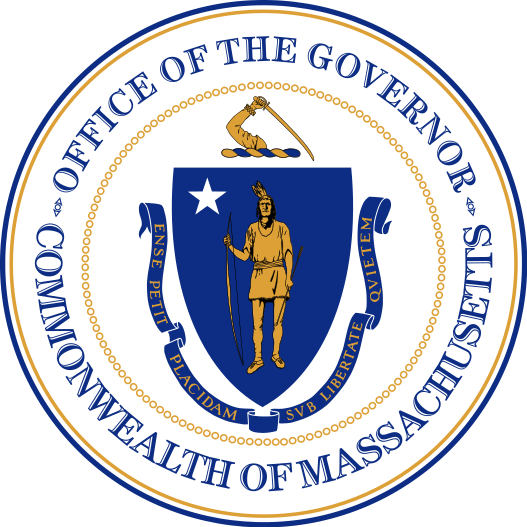- Office of Governor Charlie Baker and Lt. Governor Karyn Polito
- Governor's Press Office
- Governor's Council to Address Sexual Assault and Domestic Violence
Media Contact
Sarah Finlaw, Press Secretary, Governor's Office

BOSTON — Today, Governor Charlie Baker and Lt. Governor Karyn Polito, Chair of the Governor's Council to Address Sexual Assault and Domestic Violence, released abiennial report highlighting the Council’s accomplishments for 2019-2020 and recommendations for the next two years. In April 2019, Governor Baker issued Executive Order No. 586, reaffirming the Baker-Polito Administration’s commitment to helping individuals, children, and families in the Commonwealth live a life free of sexual assault, domestic violence and exploitation.
“Since 2015, the Governor’s Council to Address Sexual Assault and Domestic Violence has collaborated with advocates, partners and key stakeholders and worked tirelessly to support survivors throughout the Commonwealth,” said Governor Charlie Baker. “I am grateful to Lt. Governor Polito and the Council for its continued commitment to this important effort.”
“Now more than ever, as we continue to combat COVID-19, it is critical that individuals and families experiencing violence at home have access to resources and support,”said Lt. Governor Polito. “This Council and its essential partners are dedicated to ensuring that survivors of sexual assault and domestic violence know that they are not alone, and that they are able to lead safe and healthy lives through access to these vital services.”
Following the December 2018 release of its End of Term Report, the Council issued its 2019-2020 Action Plan outlining the Council’s goals and deliverables. Over the past two years, the Council has focused on the 2019-2020 action plan, while also pivoting to meet the demands of the COVID-19 pandemic.
The report released today outlines major accomplishments and provides recommendations from the Council’s five subcommittees: Assessment and Response; Human Trafficking; Military, Veterans, and Families; Housing Stability and Self-Sufficiency; and Prevention and Education. The report also includes a status update on the COVID-19 response relative to sexual assault and domestic violence (SDV) providers and the RESPECTfully public awareness campaign. The Council's most notable achievements over the past two years include the following:
Human Trafficking: Combatting Commercial Sexual Exploitation in the Commonwealth
In October 2019, the Commonwealth was awarded a three-year, $1.5M grant from the United States Department of Justice (DOJ), Office for Victims of Crime (OVC) to combat commercial sexual exploitation in Massachusetts. The goals of the grant are focused on strengthening law enforcement coordination, home-based placements for child and youth victims, and supporting a coordinated approach for responding to cases of human trafficking across counties. Currently in the first year of the three-year grant, work is underway to enhance the Commonwealth’s response to cases of commercial sexual exploitation and support for victims to prevent further exploitation and abuse.
Response to COVID-19
In response to the COVID-19 pandemic, the Administration partnered with SDV providers and other stakeholders to ensure victims and survivors of sexual assault and domestic violence had access to resources. Specific efforts included expanding and promoting the statewide 24/7 domestic violence hotline (SafeLink) to triage calls to local area rape crisis centers, standing up 6 Isolation and Recovery sites for individualsin shelters who tested positive for COVID-19, distributing personal protective equipment and cleaning supplies, and creating appropriate health and safety policies for SDV providers.
Sexual Assault Evidence Kit Tracking System
In 2018, An Act Relative to Criminal Justice Reform granted the Executive Office of Public Safety and Security (EOPSS) the authority to establish and maintain a statewide sexual assault evidence collection kit tracking system. After extensive engagement with state agencies and stakeholders, the Track-Kit system was implemented in every county by March 2020. The Track-Kit system provides survivors with a confidential and secure way to track the location and status of their kit, from the point of collection to its final storage location.
Violence Against Women Act (VAWA) Handbook: An Overview for Housing Providers:
In January 2020, MassHousing published a one-of-a-kind, free resource outlining the complexities related to VAWA’s housing policy for housing professionals and SDV providers across the Commonwealth. The Handbook outlines information on legal obligations and rights afforded to survivors of domestic violence, sexual assault, and stalking.
RESPECTfully Public Awareness Campaign
Through partnership with the Legislature, the FY19 and FY20 GAAs included a combined $1M of funding to develop a statewide public awareness and prevention campaign. In May 2019, the Administration launched RESPECTfully, which promotes healthy relationships among Massachusetts youth aged 12-18. Developed with extensive input from youth and subject matter experts, RESPECTfully promotes short, animated videos and organic content where youth spend their much of their time—on social media platforms and online. Phases 1 and 2 of the campaign resulted in 34,867,622 total impressions. Additional advertisements were placed in areas visible to youth across the state, including MBTA stations, MassDOT billboards, Bank of America ATM screens and at Logan Airport.
Healthy Relationship Grant Program
To enhance the RESPECTfully campaign, the FY20 GAA included $1M in grant funding to promote healthy relationships and prevent sexual assault and dating violence through direct prevention education. In February 2020, DPH awarded funding to five organizations to develop innovative, evidence-informed prevention strategies that are tailored to one or more youth populations disproportionately impacted by sexual assault and dating violence.
Subcommittee Recommendations for 2021- 2022
- Assessment and Response: The Subcommittee recommends focused attention to domestic violence homicide prevention and the Domestic Violence High Risk Teams, enhancing previous efforts to break down barriers for communities that have been traditionally marginalized, particularly areas with the highest lethality.
- Human Trafficking: The Subcommittee recommends enhancing primary and secondary prevention efforts, continuing efforts to develop Human Trafficking Guidelines and a statewide law enforcement training, and expanding survivor supports.
- Military, Veterans, and Families: The Subcommittee recommends strengthening partnerships among federal and state agencies, SDV providers, and healthcare providers to enhance hospital response for military-affiliated survivors and share information related to military benefits and human services more broadly.
- Housing Stability and Self-Sufficiency: The Subcommittee recommends collecting and reviewing data, expanding trainings and services for housing providers, and creating a new subcommittee devoted to economic self-sufficiency.
- Prevention and Education: The Subcommittee recommends continuing its collaboration with the Department of Higher Education to address issues involving sexual assault and domestic violence affecting colleges and universities across the Commonwealth.
For the full report please click here.
The Council, under Lt. Governor Polito's leadership, will continue to partner with the Baker-Polito Administration to continue the ongoing implementation of the efforts outlined by each subcommittee.
The Council is chaired by the Lt. Governor and membership consists of up to 40 individuals appointed by the Governor and Lt. Governor, plus more than 80 subcommittee members. Council members represent advocacy organizations, direct service providers, criminal justice agencies, and reflect the state’s geographic and cultural diversity. The Secretaries of Health and Human Services, Housing and Economic Development, Public Safety and Security, Education, Labor and Workforce Development, Transportation, and Veterans’ Services each appoint staff members to the Council. The Governor and Lt. Governor appointed an Executive Director, who is responsible for the administrative functions of the Council, organizing subcommittees and executing the Council’s responsibilities.
###
